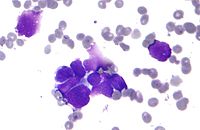
Photo from wikipedia
Background Pancreatic cancer is a highly lethal disease. Nearly half of the patients have distant metastasis and remain asymptomatic. Emerging evidence suggests that the chemokine, CXCL12, has a role in… Click to show full abstract
Background Pancreatic cancer is a highly lethal disease. Nearly half of the patients have distant metastasis and remain asymptomatic. Emerging evidence suggests that the chemokine, CXCL12, has a role in cancer metastasis. The interaction between CXCL12 and CXCR4 activates heterotrimeric G proteins, which regulates actin polymerization and cancer cell migration. However, the molecular mechanisms underlying pancreatic cancer cell migration are still largely obscure. Here, we addressed the role of ELMO2 in chemotaxis and metastasis of pancreatic cancer cells. Methods Pancreatic cancer cell lines PANC-1 and AsPC-1 and siRNA-mediated knockdown of ELMO2 were used to determine the effects of ELMO2 on cancer cell chemotaxis, invasion, migration. Co-immunoprecipitation assays were carried out to identify interacting partners of ELMO2. Results ELMO2 knockdown inhibited pancreatic cancer cell chemotaxis, migration, invasion, and F-actin polymerization. Co-immunoprecipitation assays revealed that ELMO2 interacted with Gαi2 and that CXCL12 triggered Gα i2-dependent membrane translocation of ELMO2. Thus, ELMO2 is a potential therapeutic target for pancreatic cancer.
Journal Title: PeerJ
Year Published: 2020
Link to full text (if available)
Share on Social Media: Sign Up to like & get
recommendations!